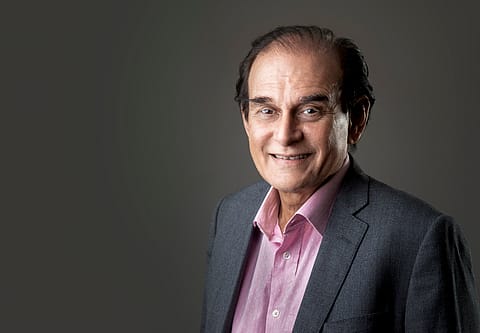Entrepreneurs, not govt, will contribute to $5 trillion eco: Harsh Mariwala
The Marico founder expects entrepreneurship to have a multiplier impact on the economy in the next 10 years

India has 90,000 start-ups today and the number is increasing as the clock ticks. Two of the leading e-commerce start-ups – Flipkart and Myntra – which are now part of Walmart, have further fuelled entrepreneurship in the country. Around 313 start-ups in the past decade have been founded by Flipkart alumni, while former Myntra employees have founded 113. In his tastefully done-up office in the western suburbs of Mumbai, veteran entrepreneur and chairman of Marico, Harsh Mariwala, effortlessly rattles off these statistics.
“The biggest change will be brought about by entrepreneurs. There is a limit to which the government can play the role of creating infrastructure or spend money on certain sectors. Beyond a point, the growth of the economy would largely be dependent on the entrepreneurial culture of the country. It’s the entrepreneur who will contribute to the $5 trillion economy, not the government,” Mariwala says in an interview with Fortune India.
“We want more and more individuals to take risks, not be afraid of failures. Of course, many of them won’t succeed but most businesses today are started by individuals who are qualified. They have a back-up of going back to a job if a business doesn’t succeed,” he adds.
His not-for-profit venture, Ascent, (which provides a platform to entrepreneurs for mentorship and an opportunity to learn from other platforms) is a decade old now. Ascent, which has mentored 840 entrepreneurs, has a cumulative turnover of ₹55,000 crore, claims Mariwala. He hopes that in the next 10 years, Ascent would mentor over 10,000 entrepreneurs and touch a turnover of ₹500,000 crore.
The New-Age Entrepreneur
More individuals are wanting to take risks and start a business, says Mariwala. “That is driven by successful entrepreneurs who have created unicorns, and that has brought in a lot of confidence.” Unlike earlier, most new-age entrepreneurs, says Mariwala, don’t come from legacy business families. Neither are they only from metro cities. The biggest surprise for him in the past few years has been the entrepreneurial fire of small-town entrepreneurs. “We have entrepreneurs coming from Srinagar, Cooch Behar, Dharwad, Bhuj and Guwahati. We see a substantial potential to add many more numbers to the Ascent membership.”
There are far more funding options. “If I am coming from a non-business family and I don’t have money, in the past there were not too many funding options. Today, there are multiple funding options. There are angel investors or banks or private equity or family offices. There is an ecosystem for entrepreneurship that is getting built. You also have consultants and advisors you can go to for advice.”
Mariwala expects entrepreneurship in the next 10 years to have a multiplier effect. “Unless that happens India’s growth story would remain on paper. The world demographic dividend, all that only an entrepreneur would be able to do it. The role of the government is to make policies and create infrastructure, not start businesses. The government is exiting many businesses and that’s what they should be doing.”
Capitalising on Disruptions
Recommended Stories
Mariwala is particularly ecstatic about the new breed of entrepreneurs’ capability to capitalise on disruptions. “Any disruption in the environment brings in opportunities. Covid-19 led to opportunities around digital, health, immunity and mental health, and entrepreneurs have built successful businesses.”
While Covid has thrown up significant opportunities around e-commerce, e-learning, digital payments, health and wellness and veganism, the Russia-Ukraine war has thrown up supply chain opportunities, and companies are looking to shift their sourcing and manufacturing from China to India and Bangladesh, and that puts India in a sweet spot, says the businessman.
Future of Entrepreneurship
The future lies in sustainability-led businesses, says Mariwala. Hydrogen, solar power, and reusing and recycling plastics are going to be huge opportunities. And it’s not just about making environment-friendly products, it’s equally about doing good to the larger ecosystem. “If I am making a product, which is not good environmentally, there will be enough pressure. Similarly, if I were to attract a good board of directors, they will see what my ESG track record is, and even funders will look at ESG. Therefore, sustainability will be a huge focus area for not just big companies but also entrepreneurs.
(INR CR)